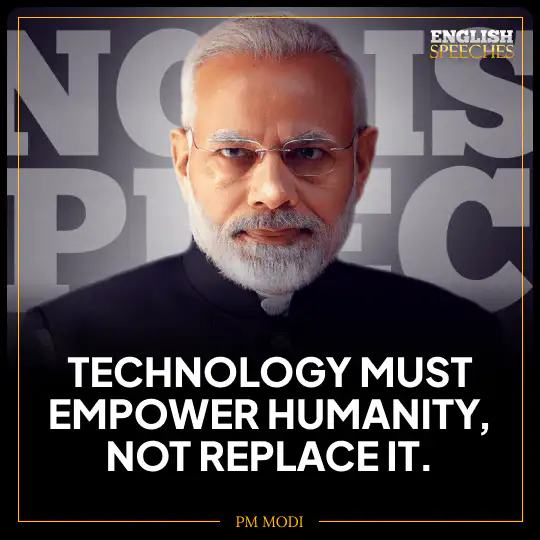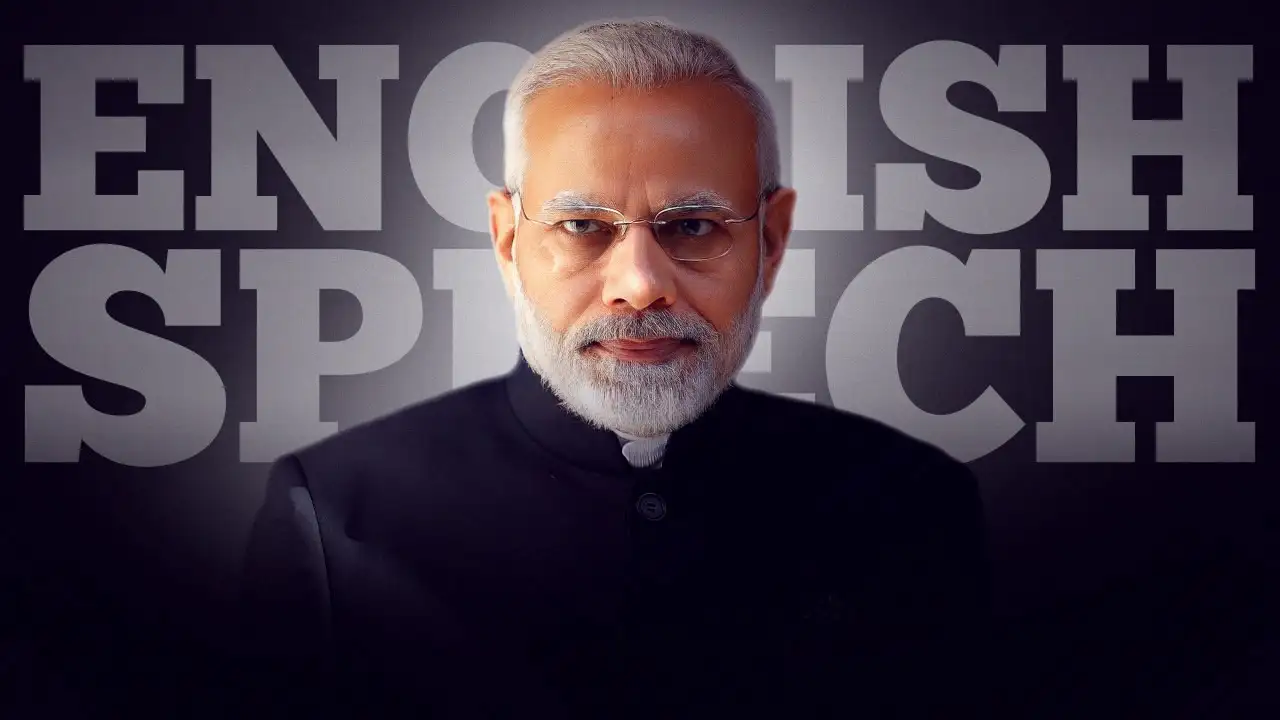Learn English with PM Narendra Modi. At the AI Action Summit in Paris, PM Modi delivers a compelling speech on the future of AI, governance, and innovation. He highlights India’s leadership in AI adoption, the importance of transparency, ethical AI use, and ensuring global access to AI resources. Watch as he discusses how AI can reshape economies, job markets, and sustainable development goals.
Who This Speech Is For
- Learners interested in artificial intelligence, technology governance, and digital transformation.
- Those who want to improve their ability to discuss AI’s impact on jobs, ethics, and global cooperation.
- Intermediate to advanced English learners studying structured and policy-driven speeches.
How This Speech Helps Your English
- Learn how to discuss complex technological topics in a clear and persuasive manner.
- Expand vocabulary related to artificial intelligence, digital governance, and economic development.
- Observe how structured argumentation and global cooperation are presented in political discourse.
- Understand how to balance optimism and caution when discussing innovation.
Why This Speech Matters
- Highlights India’s role in AI development and digital infrastructure for over 1.4 billion people.
- Addresses the ethical and economic implications of AI on a global scale.
- Calls for responsible AI governance to ensure innovation benefits all, especially the Global South.

”Technology must empower humanity, not replace it.
Download available
for Plus Members
PDF Transcript
Access the full speech in an
easy-to-read PDF format.
Audio Version
Listen and download clear,
high-quality MP3 recordings.
English Lesson
Includes vocabulary
and grammar practice.
Offer ends in:
Offer ended.
Transcript
Excellencies, friends, let me begin with a simple experiment. If you upload your medical report to an AI app, it can explain in simple language, free of any jargon, what it means for your health. But if you ask the same app to draw an image of someone writing with their left hand, the app will most likely draw someone writing with the right hand. Because that is what the training data is dominated by.
It shows that while the positive potential of AI is absolutely amazing, there are many biases that we need to think carefully about. That is why I am grateful to my friend President Macron for hosting this summit and for inviting me to co-chair it.
Friends, AI is already reshaping our quality, our economy, our security, and even our society. AI is writing the code for humanity. AI is writing the code for humanity in this century. But it is very different from other technology milestones in human history. AI is developing at an unprecedented scale and speed, and being adapted and deployed even faster. There is also a deep interdependence across borders.
Therefore, there is a need for collective global efforts to establish governance and standards that uphold our shared values, address risks, and build trust. But governance is not just about managing risks and rivalries. It is also about promoting innovation and deploying it for the global good. So we must think deeply and discuss openly about innovation and governance.
Governance is also about ensuring access to all, especially in the global south. It is where the capabilities are most lacking, be it compute power, talent, data, or the financial resources.
Friends, AI can help transform millions of lives by improving health, education, agriculture, and so much more. It can help create a world in which the journey to sustainable development goals becomes easier and faster. To do this, we must pull together resources and talent.
We must develop open-source systems that enhance trust and transparency. We must build quality data sets free from biases. We must democratize technology and create people-centric applications. We must address concerns related to cybersecurity, disinformation, and deepfakes. And we must also ensure that technology is rooted in local ecosystems for it to be effective and useful.
Friends, loss of jobs is AI’s most feared disruption. But history has shown that work does not disappear due to technology. Its nature changes, and new types of jobs are created. We need to invest in skilling and re-skilling our people for an AI-driven future.
Friends, there is no doubt that the high energy intensity of AI needs to be looked into. This will require green power to fuel its future. India and France have worked together for years through initiatives like the International Solar Alliance to harness the power of the sun.
As we advance our partnership to AI, it is a natural progression from sustainability to innovation to shape a smarter and responsible future. At the same time, sustainable AI does not only mean using clean energy. AI models must also be efficient and sustainable in size, data needs, and resource requirements. After all, the human brain manages to compose poetry and design spaceships using less power than most light bulbs.
Friends, India has successfully built a digital public infrastructure for over 1.4 billion people at a very low cost. It is built around an open and accessible network. It has regulations and a wide range of applications to modernize our economy, reform governance, and transform the lives of our people.
We have unlocked the power of data through our data empowerment and protection architecture. And we have made digital commerce democratic and accessible to all. This vision is the foundation of India’s national AI mission. That is why during our G20 presidency, we built a consensus on harnessing AI responsibly for good and for all.
Today, India leads in AI adoption and techno-legal solutions on data privacy. We are developing AI applications for public good. We have one of the world’s largest AI talent pools. India is building its own large language model considering our diversity. We also have a unique public-private partnership model for pooling resources like compute power. It is made available to our startups and researchers at an affordable cost. And India is ready to share its experience and expertise to ensure that AI’s future is for good and for all.
Friends, we are at the dawn of the AI age that will shape the course of humanity. Some people worry about machines becoming superior in intelligence to humans. But no one holds the key to our collective future and shared destiny other than us humans. That sense of responsibility must guide us.
Thank you.






